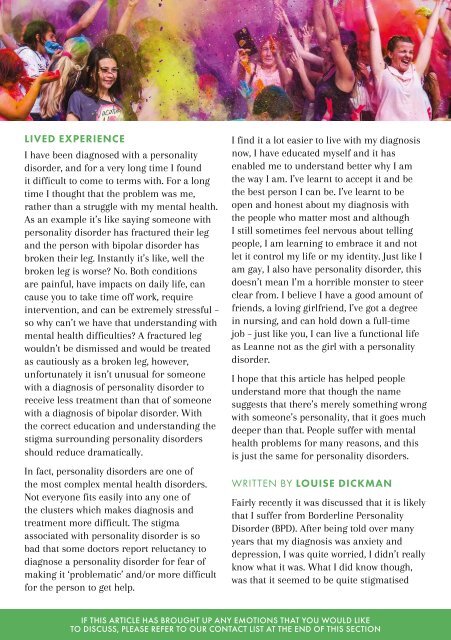Student Life August 2019
Create successful ePaper yourself
Turn your PDF publications into a flip-book with our unique Google optimized e-Paper software.
LIVED EXPERIENCE<br />
I have been diagnosed with a personality<br />
disorder, and for a very long time I found<br />
it difficult to come to terms with. For a long<br />
time I thought that the problem was me,<br />
rather than a struggle with my mental health.<br />
As an example it’s like saying someone with<br />
personality disorder has fractured their leg<br />
and the person with bipolar disorder has<br />
broken their leg. Instantly it’s like, well the<br />
broken leg is worse? No. Both conditions<br />
are painful, have impacts on daily life, can<br />
cause you to take time off work, require<br />
intervention, and can be extremely stressful –<br />
so why can’t we have that understanding with<br />
mental health difficulties? A fractured leg<br />
wouldn’t be dismissed and would be treated<br />
as cautiously as a broken leg, however,<br />
unfortunately it isn’t unusual for someone<br />
with a diagnosis of personality disorder to<br />
receive less treatment than that of someone<br />
with a diagnosis of bipolar disorder. With<br />
the correct education and understanding the<br />
stigma surrounding personality disorders<br />
should reduce dramatically.<br />
In fact, personality disorders are one of<br />
the most complex mental health disorders.<br />
Not everyone fits easily into any one of<br />
the clusters which makes diagnosis and<br />
treatment more difficult. The stigma<br />
associated with personality disorder is so<br />
bad that some doctors report reluctancy to<br />
diagnose a personality disorder for fear of<br />
making it ‘problematic’ and/or more difficult<br />
for the person to get help.<br />
I find it a lot easier to live with my diagnosis<br />
now, I have educated myself and it has<br />
enabled me to understand better why I am<br />
the way I am. I’ve learnt to accept it and be<br />
the best person I can be. I’ve learnt to be<br />
open and honest about my diagnosis with<br />
the people who matter most and although<br />
I still sometimes feel nervous about telling<br />
people, I am learning to embrace it and not<br />
let it control my life or my identity. Just like I<br />
am gay, I also have personality disorder, this<br />
doesn’t mean I’m a horrible monster to steer<br />
clear from. I believe I have a good amount of<br />
friends, a loving girlfriend, I’ve got a degree<br />
in nursing, and can hold down a full-time<br />
job – just like you, I can live a functional life<br />
as Leanne not as the girl with a personality<br />
disorder.<br />
I hope that this article has helped people<br />
understand more that though the name<br />
suggests that there’s merely something wrong<br />
with someone’s personality, that it goes much<br />
deeper than that. People suffer with mental<br />
health problems for many reasons, and this<br />
is just the same for personality disorders.<br />
WRITTEN BY LOUISE DICKMAN<br />
Fairly recently it was discussed that it is likely<br />
that I suffer from Borderline Personality<br />
Disorder (BPD). After being told over many<br />
years that my diagnosis was anxiety and<br />
depression, I was quite worried, I didn’t really<br />
know what it was. What I did know though,<br />
was that it seemed to be quite stigmatised<br />
IF THIS ARTICLE HAS BROUGHT UP ANY EMOTIONS THAT YOU WOULD LIKE<br />
TO DISCUSS, PLEASE REFER TO OUR CONTACT LIST AT THE END OF THIS SECTION


















